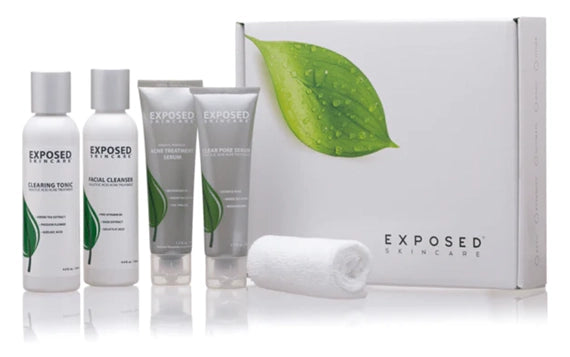Among these myriad skincare options, shea butter is often touted as an all-in-one moisturizer, ideal for treating everything from dry skin to damaged hair. But what about its effects on acne-prone skin?
Does shea butter cause acne, or is it a harmless, even beneficial, component for your skincare routine? This blog will address this question as we delve into the relationship between shea butter and acne.
Also read: How to choose the best acne treatment
Biggest Take-Aways:
- Shea butter is generally non-comedogenic and is unlikely to clog pores, although individual experiences may vary.
- The quality of shea butter matters; it is best sourced from high-quality, raw shea nuts.
- Shea butter has versatile skincare benefits, including moisturizing, anti-inflammatory, and anti-aging properties.
- Pairing shea butter with a comprehensive acne management system like Exposed Skin Care can provide synergistic benefits for a more effective skincare routine.
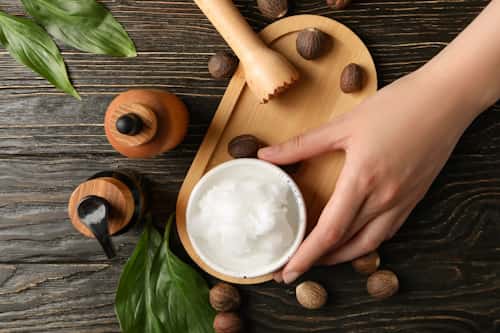
What is Shea Butter?
Shea butter is a natural fat extracted from the nut of the African shea tree. It's a rich source of fatty acids and vitamins that benefit the skin. Shea butter has been used for centuries to moisturize and heal the skin.
The Composition of Shea Butter
- Fatty Acids: Oleic, stearic, linoleic, and palmitic acids comprise most of the shea butter. These fatty acids are known for their emollient properties.
- Vitamins: Rich in Vitamins A, E, and F, which are essential for skin health.
- Antioxidants: Shea butter is also filled with antioxidants like catechins, which can help reduce the appearance of fine lines and other signs of aging.
- Anti-inflammatory Properties: Shea butter has anti-inflammatory and healing benefits that may make skin appear smoother and less irritated.
Types of Shea Butter
Shea butter comes in various forms, such as unrefined, refined, and shea butter oil. Each type has its unique characteristics, affecting its application and impact on the skin.
- Unrefined Shea Butter: This form of shea butter is raw and extracted without chemicals. It is generally considered the purest and most beneficial form of shea butter for the skin.
- Refined Shea Butter: This purified version may contain fewer nutrients due to the refinement process.
- Shea Butter Oil: This is shea butter in liquid form. It often contains a mix of other oils and may not offer the full skincare benefits of pure shea butter.
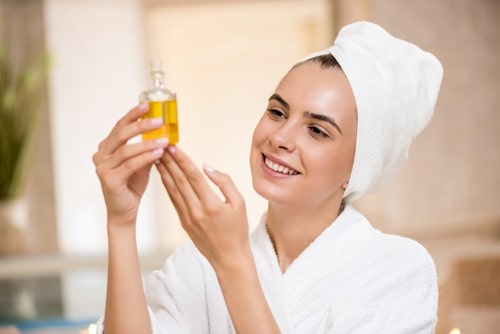
Does Shea Butter Cause Acne?
The central question many people have is, does shea butter cause acne? To answer this, let's first discuss the comedogenicity of shea butter. Comedogenic substances have the potential to clog pores, leading to acne breakouts.
Is Shea Butter Comedogenic?
Contrary to popular belief, shea butter is non-comedogenic. According to the comedogenic scale, which rates how likely an ingredient is to clog your pores, shea butter ranks relatively low. This implies that using shea butter may not clog pores and cause acne for most people.
However, individual experiences may vary depending on skin type and the quality of the shea butter product used. Below are factors that influence shea butter’s effects on acne-prone skin.
- Skin Type: You might be more prone to acne if you have oily skin, but shea butter may not be the cause.
- Application Method: How you apply shea butter to your face can affect its impact. Over-applying or mixing it with other comedogenic products can lead to clogged pores.
- Quality: Always opt for high-quality shea butter. The lower the quality, the higher the likelihood of clogging pores.
Benefits of Shea Butter for Different Skin Types
While the primary concern is often whether shea butter causes acne, it’s essential to recognize this natural ingredient's array of skincare benefits. Its effects can differ based on your skin type.
For Dry Skin
- Retains Moisture: Shea butter is an excellent moisturizer for your skin, forming a barrier on the skin that helps it retain moisture.
- Heals Damaged Skin: Its healing properties make it great for dry skin, especially in harsh weather conditions.
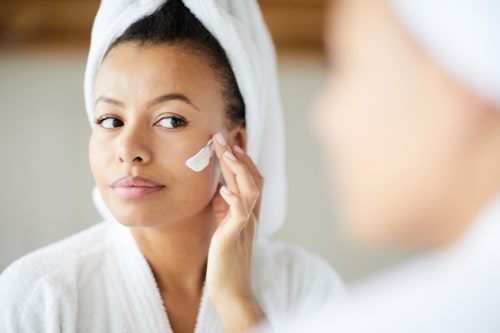
For Oily Skin
- Balances Oil Production: Even though it is a butter, shea butter can help balance sebum production, making it suitable for combination or oily skin.
For Irritated Skin
- Soothing Effect: Shea butter can help soothe and reduce inflammation if you have irritated skin.
How to Use Shea Butter Effectively
Choosing the right way to use shea butter is crucial, especially if you have acne-prone skin.
Products to Look For
- Creams: Opt for creams with shea butter as one of the active ingredients.
- Masks: A mask containing shea butter can offer deep hydration.
- Serums: These products often blend active ingredients and shea butter for targeted treatment.
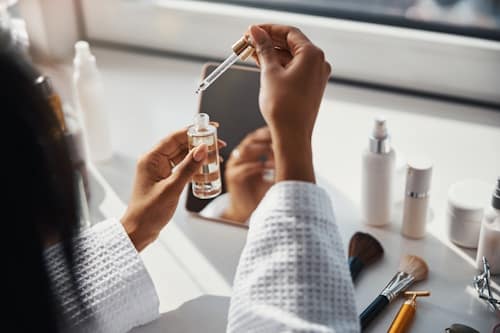
Application Tips for Acne-Prone Skin
- Less is More: Use a small amount. Over-application could clog your pores and potentially lead to breakouts.
- Spot Test: Always do a small patch test to see if you have any adverse reaction to shea butter.
- Pure is Best: Opt for unrefined, high-quality shea butter for maximum skincare benefits without additives that could clog pores and cause acne.
- Apply to Damp Skin: This enhances its ability to lock in moisture without clogging pores.
How Exposed Skin Care Can Be Your Ally in Managing Acne
If you're already intrigued by the idea of incorporating shea butter into your skin care regimen, consider elevating your routine with Exposed Skin Care products. Designed to manage acne effectively, these products offer a range of benefits that work in synergy with the properties of shea butter.
Here's how Exposed Skin Care can help you:
- Non-Comedogenic Formulation: Exposed Skin Care products are formulated not to cause breakouts. They work harmoniously with the application of shea butter on the face.
- Enhanced Efficacy: The consistency of shea butter works well with the texture of Exposed Skin Care serums and creams, maximizing absorption into the human skin.
- Multiple Active Ingredients: Shea butter is rich in fatty acids and vitamins. Exposed Skin Care products, on the other hand, contain advanced scientific ingredients that address various skin conditions. Together, they offer a comprehensive treatment plan.
- Anti-Aging Benefits: Shea butter has soothing and anti-aging properties. When combined with Exposed Skin Care, the effects can be amplified, making your skin look and feel younger.
- High-Quality Ingredients: Just like high-grade, raw shea butter extracted from shea tree nuts is superior, Exposed Skin Care also prides itself on using top-notch ingredients.
- Minimal Adverse Effects: While some products might cause adverse effects from using them on the surface of your skin, Exposed Skin Care is designed to be gentle yet effective.
So, if you're contemplating the benefits of shea butter, pairing it with Exposed Skin Care could offer you a well-rounded, effective acne management system.
Conclusion
The question of "Does shea butter clog pores?" has been much debated. Shea butter is a versatile skincare product, rich in vitamins and fatty acids that have various beneficial effects on the skin. It's extracted from shea nuts, collected mainly in Africa, and has similar but distinct properties to cocoa butter.
Shea butter also has soothing and anti-aging effects, which are a boon for many skin types. The complexity of shea butter or shea butter oil lies in its varying effects on different skin types.
While it is known for its moisturizing and healing properties that may make skin appear smoother and more youthful, there are questions about shea butter’s potential to clog pores and cause acne, particularly for those with certain skin types.
Like shea butter, Exposed Skin Care offers a comprehensive range of products designed to tackle acne and improve overall skin health. The brand could complement shea butter perfectly, offering synergistic benefits for those looking to enhance their skincare routine.
In the ever-evolving skincare world, reliable and effective products are necessary. Shea butter has also been part of many skincare routines, providing unique benefits. Pairing it with scientifically advanced options like Exposed Skin Care can offer a more holistic approach to maintaining a healthy, glowing complexion.
FAQs
Does Shea Butter Clog Pores?
No, shea butter is generally non-comedogenic, meaning it's unlikely to clog pores.
What is Shea Butter Made From?
Shea butter is extracted from the nuts of the shea tree, primarily found in Africa.
How Does Shea Butter Affect Acne-Prone Skin?
While some individuals find it beneficial, others might experience breakouts. It varies depending on skin type and the quality of the shea butter used.
Is Shea Butter Suitable for All Skin Types?
Generally, yes. However, it's essential to patch test before full application, especially if you have sensitive or acne-prone skin.
How is Shea Butter Different From Cocoa Butter?
Shea butter is richer in vitamins and has anti-inflammatory properties, while cocoa butter is more often used for its moisturizing benefits.
Can Shea Butter Be Used With Other Skincare Products?
Yes, shea butter can complement other skincare products like Exposed Skin Care, designed to manage acne effectively.












